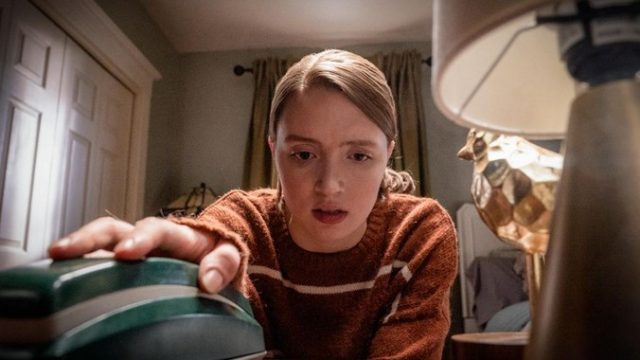In many ways, Run is as basic as a movie can get–the story’s fundamentals are clear from the start, with the “twist” being so obvious that even the protagonist seems to react with little surprise, and there’s very little outside those fundamentals. It would be hard to discuss–at least coherently–what this film “says” about disability, abuse, the American medical system, the suburbs, or even the Gypsy Rose Blanchard case, its clearest source of inspiration. Director Aneesh Chaganty doesn’t seem to be aiming to make a movie that can be described as a “critique” or “examination” of anything, which is for the best–firstly because it means the film thoroughly avoids heavy-handedness and secondly and more importantly because this is, after all, a film with a title designed to emphasize what its wheelchair-using heroine cannot do. Get it? She literally can’t run, guys! That decision does not imply the kind of subtlety or thoughtfulness you’d want in an artier, more humanistic film.
However, for much of its length, Run is a gripping, spectacularly tense domestic thriller full of intimate horror and sparkling bits of ingenuity. It’s anchored by intense, convincing performances from Sarah Paulson and Kiera Allen (in a stunning debut). Watching it, it doesn’t matter that the overall arc of the plot is predictable, because Chaganty and his leads make the minute-by-minute working-out of that plot impossible to look away from. Kiera Allen’s Chloe is essentially faced with a dense ninety minutes of complex, high-stakes problem-solving, and it’s pure pleasure to watch her come through. This narrow focus on the horrific give-and-take between mother (Paulson) and daughter (Allen) is where Chaganty really shines. Chloe uses a wheelchair, and so does Allen: people have advocated for years for the casting of disabled parts to go, where possible, to actors who actually have those disabilities. You’d think, then, that casting the unknown Allen would be a strange bit of informed understanding from, as I said above, a movie called Run, a movie where a key sense of triumph partly hinges on a formerly paralyzed character being able to walk again. But actually, Allen’s casting isn’t an aberration, a good spot in an otherwise hit-or-miss portrayal of disability: it’s fundamentally tied to the film’s strengths, to that sense of grueling practical problem-solving. Allen’s familiarity and expertise with her chair needs to be true in order to ground the movie’s stunts and imbue Chloe with the sense of complete, honed confidence in herself. Allen would be a remarkable young actress in any case, but her experience gives her a profound effectiveness in the role that Chaganty smartly sees and cashes in on. It’s all about selling it, immersing the viewer in Chloe’s fight.
And that immersion is nearly total. (There are more weaknesses towards the end, especially Diane’s (Paulson) apparent decision to have kept around a box of evidence that might as well have been labeled A PROSECUTOR’S DREAM.) We all know the story of the devoted, driven mother whose daughter has several debilitating illnesses (in Chloe’s case, partial paralysis, asthma, rashes, diabetes, and arrhythmia), and even before Chloe finds a suspiciously labeled bottle of pills in her mother’s possession, we can guess where this is going. But we can’t guess all the details of, say, Chloe’s struggle to identify the mystery medication, a seemingly simple task that, for perfectly plausible reasons, winds up needing all her ingenuity. When Diane soothingly explains that she’ll absolutely let Chloe know the second a college acceptance letter arrives on her doorstep, we know she’s lying, but Chaganty still produces the flawless moment of Chloe realizing her mother has raced to collect the mail from the doorstep so fast that she’s left her car door hanging open. There are also several occasions where the film bobs and weaves, avoiding the most predictable outcomes: Chaganty lets the story accelerate naturally, with frightening results, and evokes a horror movie feel without always relying on familiar horror tropes.
The result is a flawed but highly watchable film, a kind of glossed-up and tightly structured Lifetime movie. I mean that as a compliment, and if that sounds like something you would like, it’s also a strong recommendation.
Run is available streaming on Hulu.

